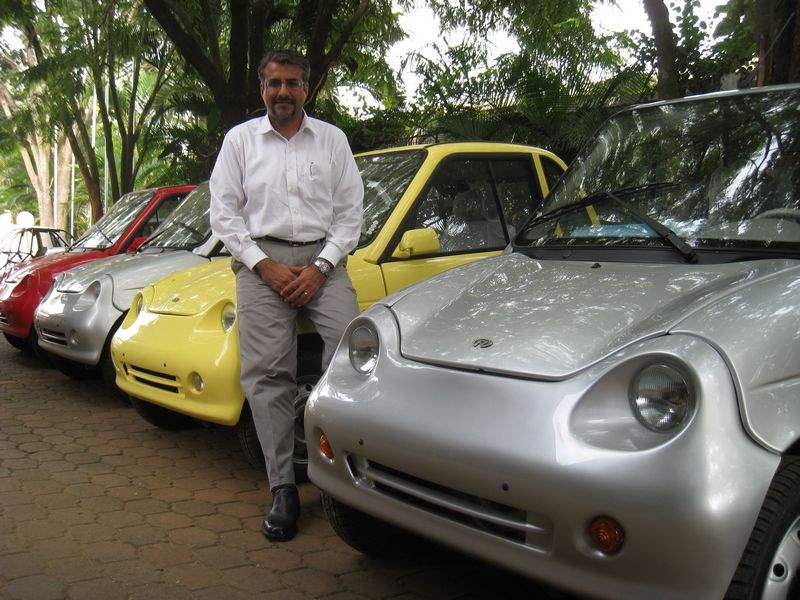
INDIA: DRIVEN TO COMPETE
Company strives to fine-tune fully electric vehicle
REVA recharge costs 80 cents
11/30/2009
Chetan Maini is the brains behind the REVA, a two-door hatchback selling for $8,000 to $10,000 with a top speed of 50 mph. He believes his company can sell 50,000 per year in five years.
The Blade/Steve Eder
Buy This Image

Chetan Maini is the brains behind the REVA, a two-door hatchback selling for $8,000 to $10,000 with a top speed of 50 mph. He believes his company can sell 50,000 per year in five years.
BANGALORE, India -- If the challenges from India's long-established automakers and parts suppliers weren't enough to turn heads in the United States, some of the nation's most progressive and brightest minds are hard at work refining a fully electric car, the REVA.
Since its launch in 2001, REVA Electric Car Co. -- a joint India-U.S. venture based in Bangalore in partnership with AEV LLC of California -- has placed about 2,500 fully electric cars on Indian and European roads.
In five years, Chetan Maini, the chief technology officer and brains behind the REVA -- a two-door hatchback selling for $8,000 to $10,000 and rechargeable for 80 cents - believes he can sell 50,000 electric cars per year.
And in 10 years?
"I don't see why a million units is not possible," said Mr. Maini during an interview at the REVA production plant in Bangalore.
READ MORE: Driven To Compete: India's auto industry

To get to that point, Mr. Maini and his team of engineers will need to make the REVA capable of traveling 50 miles without needing to be plugged in for a charge. The car, which is nearly silent when it is in motion, reaches a maximum speed of 50 mph.
REVA, which is available in five colors and can seat two adults and two children, comes equipped with air conditioning and safety features and takes eight hours to fully charge. Special options include keyless entry, climate control seats, and leather steering wheel and seats.
When gas prices spiked to more than $4 a gallon this year and with the mounting concern about vehicle emissions, Mr. Maini said he saw a need to develop electric cars not only for India, but for use in the rest of the world, including in the United States.
"Our vision is to be the Earth's favorite electric car company," said Mr. Maini, whose family owns the Maini Group, a conglomeration of automotive companies.
He graduated from the University of Michigan and Stanford University with degrees in mechanical engineering.
Mr. Maini doesn't see any market as off limits for electric cars.
"I do see the U.S. as a large, long-term market, but I don't see us getting there for the next few years at least," he said.
REVA isn't alone in the realm of electric car design.
For example, the Chevrolet Volt, an electric-gasoline-ethanol hybrid, is slated to be in U.S. showrooms by 2010. The Volt, which was unveiled in September, will run about 40 miles on a battery after a single charge before defaulting to gasoline or ethanol engines.
But it is expected to be priced between $30,000 and $40,000.
The success of Indian start-up companies such as REVA are deeply linked to India's future in the automobile industry, a late entrant to the global automotive market.
"There are start-up companies that are doing the most innovative thing globally and selling globally and that's a change in the industry, especially in a product-driven industry," said Mr. Maini, who once earned international recognition for his work on University of Michigan's solar car project.
"There can be huge opportunities for a country like ours. You don't have to have one hundred years experience in this area. It is a completely new technology today and it gives us an area to excel in," he said.
"Ten years from today, I hope I go to a traffic light and I look around and everything is nice and quiet and there are electric cars all around us, made by us as well as other people," said Mr. Maini.